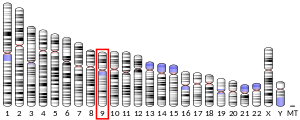Argininosuccinate synthetase 1
(Redirected from ASS1 (gene))
Argininosuccinate synthetase is an enzyme that in humans is encoded by the ASS1 gene.[5][6][7]
The protein encoded by this gene catalyzes the penultimate step of the arginine biosynthetic pathway. There are approximately 10 to 14 copies of this gene including the pseudogenes scattered across the human genome, among which the one located on chromosome 9 appears to be the only functional gene for argininosuccinate synthetase. Two transcript variants encoding the same protein have been found for this gene.[7]
Clinical significance[edit]
Mutations in the chromosome 9 copy of ASS cause citrullinemia.[5]
40% to 90%[8] of bladder cancers are deficient in argininosuccinate synthetase.[9][10][11]
References[edit]
- ^ a b c GRCh38: Ensembl release 89: ENSG00000130707 – Ensembl, May 2017
- ^ a b c GRCm38: Ensembl release 89: ENSMUSG00000076441 – Ensembl, May 2017
- ^ "Human PubMed Reference:". National Center for Biotechnology Information, U.S. National Library of Medicine.
- ^ "Mouse PubMed Reference:". National Center for Biotechnology Information, U.S. National Library of Medicine.
- ^ a b Beaudet AL, O'Brien WE, Bock HG, Freytag SO, Su TS (Mar 1986). "The Human Argininosuccinate Synthetase Locus and Citrullinemia". Advances in Human Genetics 15. Vol. 15. pp. 161–96, 291–2. doi:10.1007/978-1-4615-8356-1_3. ISBN 978-1-4615-8358-5. PMID 3513483.
- ^ Carritt B, Goldfarb PS, Hooper ML, Slack C (Jun 1977). "Chromosome assignment of a human gene for argininosuccinate synthetase expression in Chinese hamsterxhuman somatic cell hybrids". Exp Cell Res. 106 (1): 71–8. doi:10.1016/0014-4827(77)90242-7. PMID 852520.
- ^ a b "Entrez Gene: ASS1 argininosuccinate synthetase 1".
- ^ Novel Bladder Cancer Therapy Based on Arginine Deprivation Shows Promising Results
- ^ Sahu D, Gupta S, Hau AM, Nakashima K, Leivo MZ, Searles SC, Elson P, Bomalaski JS, Casteel DE, Boss GR, Hansel DE (12 December 2016). "Argininosuccinate Synthetase 1 Loss in Invasive Bladder Cancer Regulates Survival through General Control Nonderepressible 2 Kinase–Mediated Eukaryotic Initiation Factor 2α Activity and Is Targetable by Pegylated Arginine Deiminase". The American Journal of Pathology. 187 (1): 200–213. doi:10.1016/j.ajpath.2016.09.004. PMC 5225295. PMID 27979310.
- ^ Michael Allen, Nelofer Syed, Tim Crook, Louise Jones, Nicholas R. Lemoine, Dan Berney, Peter Szlosarek (15 July 2010). "Frequent ASS1 deficiency in bladder cancer and sensitivity to pegylated arginine deiminase (ADI-PEG20): A potential novel therapeutic strategy". Clinical Cancer Research. 16. A23. doi:10.1158/1078-0432.TCMUSA10-A23.
- ^ Allen MD, Luong P, Hudson C, Leyton J, Delage B, Ghazaly E, Cutts R, Yuan M, Syed N, Lo Nigro C, Lattanzio L, Chmielewska-Kassassir M, Tomlinson I, Roylance R, Whitaker HC, Anne Y. Warren, David Neal, Christian Frezza, Luis Beltran, Louise J. Jones, Claude Chelala, Bor-Wen Wu, John S. Bomalaski, Robert C. Jackson, Yong-Jie Lu, Tim Crook, Nicholas R. Lemoine, Stephen Mather, Julie Foster, Jane Sosabowski, Norbert Avril, Chien-Feng Li, Peter W. Szlosarek (2014-02-01). "Prognostic and Therapeutic Impact of Argininosuccinate Synthetase 1 Control in Bladder Cancer as Monitored Longitudinally by PET Imaging". Cancer Research. 74 (3): 896–907. doi:10.1158/0008-5472.CAN-13-1702. PMID 24285724.
Further reading[edit]
- Ikeda S (2001). "[Recent advances of the treatment in metabolic disorders]". Rinsho Shinkeigaku. 40 (12): 1264–6. PMID 11464474.
- Carritt B (1977). "Somatic cell genetic evidence for the presence of a gene for citrullinemia on human chromosome 9". Cytogenet. Cell Genet. 19 (1): 44–8. doi:10.1159/000130793. PMID 891260.
- Dhanakoti SN, Brosnan ME, Herzberg GR, Brosnan JT (1992). "Cellular and subcellular localization of enzymes of arginine metabolism in rat kidney". Biochem. J. 282 (Pt 2): 369–75. doi:10.1042/bj2820369. PMC 1130788. PMID 1312326.
- Wakui H, Komatsuda A, Itoh H, et al. (1992). "Renal argininosuccinate synthetase: purification, immunohistochemical localization, and elastin-binding property". Ren. Physiol. Biochem. 15 (1): 1–9. doi:10.1159/000173435. PMID 1372742.
- Kobayashi K, Rosenbloom C, Beaudet AL, O'Brien WE (1991). "Additional mutations in argininosuccinate synthetase causing citrullinemia". Mol. Biol. Med. 8 (1): 95–100. PMID 1943692.
- Kobayashi K, Jackson MJ, Tick DB, et al. (1990). "Heterogeneity of mutations in argininosuccinate synthetase causing human citrullinemia". J. Biol. Chem. 265 (19): 11361–7. doi:10.1016/S0021-9258(19)38601-6. PMID 2358466.
- Isashiki Y, Noda T, Kobayashi K, et al. (1989). "Identification of essential arginine residue(s) for Mg-ATP binding of human argininosuccinate synthetase". Protein Seq. Data Anal. 2 (4): 283–7. PMID 2788888.
- Jinno Y, Nomiyama H, Matuo S, et al. (1987). "Structure of the 5' end region of the human argininosuccinate synthetase gene". J. Inherit. Metab. Dis. 8 (3): 157–9. doi:10.1007/BF01819307. PMID 3027451. S2CID 32917363.
- Freytag SO, Beaudet AL, Bock HG, O'Brien WE (1985). "Molecular structure of the human argininosuccinate synthetase gene: occurrence of alternative mRNA splicing". Mol. Cell. Biol. 4 (10): 1978–84. doi:10.1128/mcb.4.10.1978. PMC 369014. PMID 6095035.
- Bock HG, Su TS, O'Brien WE, Beaudet AL (1983). "Sequence for human argininosuccinate synthetase cDNA". Nucleic Acids Res. 11 (18): 6505–12. doi:10.1093/nar/11.18.6505. PMC 326390. PMID 6194510.
- Freytag SO, Bock HG, Beaudet AL, O'Brien WE (1984). "Molecular structures of human argininosuccinate synthetase pseudogenes. Evolutionary and mechanistic implications". J. Biol. Chem. 259 (5): 3160–6. doi:10.1016/S0021-9258(17)43275-3. PMID 6321498.
- Kobayashi K, Kakinoki H, Fukushige T, et al. (1995). "Nature and frequency of mutations in the argininosuccinate synthetase gene that cause classical citrullinemia". Hum. Genet. 96 (4): 454–63. doi:10.1007/BF00191806. PMID 7557970. S2CID 861085.
- Kobayashi K, Shaheen N, Terazono H, Saheki T (1994). "Mutations in argininosuccinate synthetase mRNA of Japanese patients, causing classical citrullinemia". Am. J. Hum. Genet. 55 (6): 1103–12. PMC 1918437. PMID 7977368.
- Shaheen N, Kobayashi K, Terazono H, et al. (1996). "Characterization of human wild-type and mutant argininosuccinate synthetase proteins expressed in bacterial cells". Enzyme Protein. 48 (5–6): 251–64. doi:10.1159/000474998. PMID 8792870.
- Gress TM, Müller-Pillasch F, Geng M, et al. (1996). "A pancreatic cancer-specific expression profile". Oncogene. 13 (8): 1819–30. PMID 8895530.
- Ji H, Reid GE, Moritz RL, et al. (1997). "A two-dimensional gel database of human colon carcinoma proteins". Electrophoresis. 18 (3–4): 605–13. doi:10.1002/elps.1150180344. PMID 9150948. S2CID 25454450.
External links[edit]
- GeneReviews/NCBI/NIH/UW entry on Urea Cycle Disorders Overview
- GeneReviews/NCBI/NIH/UW entry on Argininosuccinate Synthetase Deficiency; ASS Deficiency; Argininosuccinic Acid Synthetase Deficiency; CTLN1; Citrullinemia, Classic
- Human ASS1 genome location and ASS1 gene details page in the UCSC Genome Browser.







